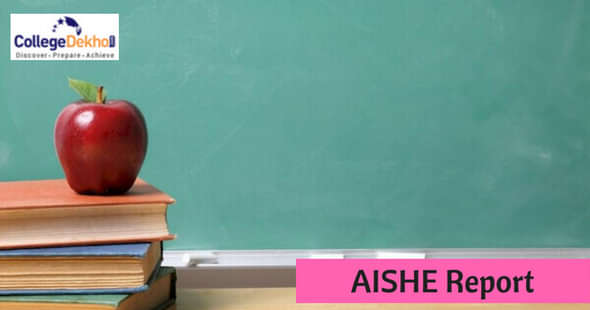The AISHE report for the year 2018-19 has been released. UP and Karnataka have more female enrolment in higher education and the ratio of male students is higher than females on almost every level, except Certificate, Post Graduate and M.Phil.

The All India Survey of Higher Education (AISHE) report for 2018-19 has been released. As per the report, UP and Karnataka have more female enrolment in higher education. Also, the ratio of male students is higher than females on every level except certificate, Post Graduate and M.Phil. The higher rate of male enrolment than female enrolment is witnessed at all levels in many states.
Highlights of AISHE Report 2018-19:
- UP has 49.30% male and 50% females as per the survey. In Karnataka, female enrolment is 50.04%.
- Maharashtra has recorded the second-highest student enrolment with roughly 54.95% male and 45.05% females.
- Tamil Nadu has 50.87% males and 49.13% females whereas West Bengal has 50.37% males and 49.63% females.
- In Rajasthan, male enrollment number is higher as compared to the females.
- UG level student enrolment is 51% males and 49% females across India.
- For diploma, it is 66.8% of males and 33.2% of females.
- PhD has 56.18% males and 43.82% females.
- For integrated levels, it is 57.50% for males and 42.50% for females.
- For PG Diploma students, enrolment is 54.09% for male students and 45.91% for female students.
- The top 6 States having highest student enrollment are UP, Tamil Nadu, Maharashtra, Rajasthan, Karnataka and West Bengal. However, when it comes to the total number of institutes, the state-wise ranking is different with UP (8077) at the top followed by Maharashtra (6662), Karnataka (5028), Rajasthan (3723), Andhra Pradesh (3540) and Tamil Nadu (3443).
- The above mentioned 6 states with the highest student enrolment have roughly 54.23% of the total student enrolment in India
- Remaining 30 States (including UTs) have only 25.76% of the total student enrolment.
- The survey covers all institutes of higher education in India, and the institutes are categorised in 3 broad categories such as College, University and Stand-alone institutes (offering Paramedical, Diploma, Hotel Management and Catering courses).
- There are a total of 993 Universities, 39931 Colleges and 10725 Stand Alone Institutions listed on the AISHE web portal and out of that, 962 Universities, 38179 Colleges and 9190 Stand Alone Institutions have responded during the survey. 298 Universities are affiliating.
- More male teachers in Higher Educational Institutions (HEIs) in India than females, with the lowest gender proportion in Bihar.
- 4,16,299 is the total number of teachers out of which about 57.8 per cent are male teachers and 42.2 per cent are female teachers. In Bihar, 78.97 per cent are male teachers and 21.03 per cent are females.
- Jharkhand has 69.8 per cent male teachers and 30.2 per cent female teachers.
- UP has 32.3 per cent, female teachers.
-
At All India level, there are just 73 female teachers per 100 male teachers.
Read more at:
http://timesofindia.indiatimes.com/articleshow/71255357.cms?utm_source=contentofinterest&utm_medium=text&utm_campaign=cppst
Highlights of AISHE Report 2017-18:
- As per the AISHE report 2017-18, female enrolment in institutes of national importance is lower than other universities. The government deemed universities, state, private and open universities have also enrolled fewer female students in 2017-18.
- As far as the GER (Gross Enrollment Ratio) in 2017-18 concerned, it has gone up to 25.8%. AISHE has calculated GER for the age group of 18-23 years.
- AISHE report further revealed that the total enrolment in higher education in the year 2017-18 was 36.6 million with 17.4 million girls and 19.2 million boys.
- The enrolment of girls during the academic year 2017-18 stood at 47.6%.
- The Gross Enrollment Ratio (GER) for the female population is 25.4% while the GER for the male population is 26.3%.
- AISHE report further revealed that more males received PhD degrees in 2017 in the science stream.
- Overall, 34,000 students awarded a PhD degree in 2017.
- The number of PhD degree awarded in 2017 was 20,179 to males and 14,221 to females.
- The highest number of PhD degrees awarded were in the Science stream followed by Engineering & Technology.
- As far as the PG courses are concerned, maximum students enrolled in social sciences followed by management stream.
- Uttar Pradesh bagged the top spot in terms of student enrolment followed by Maharashtra and Tamil Nadu.
- The total number of international students enrolled in Indian institutes during the academic session 2017-18 was 46,114.
Also Read: IIT Delhi Enrols 16% Girl Students in All Courses
This is the first time as per the AISHE report that all the major stakeholders of higher education such as UGC, AICTE, MCI as well as the State Governments have taken part in the data collection exercise. The data was collected on the basis of various parameters such as student enrolment, programmes, examination results, education finance, infrastructure, teachers etc. Institution Density, Gross Enrolment Ratio, Pupil-Teacher Ratio, Gender Parity Index etc are some of the indicators of educational development which were calculated from the data collected by AISHE.
For the latest education news & updates, stay tuned to CollegeDekho .


 Follow us
Follow us













